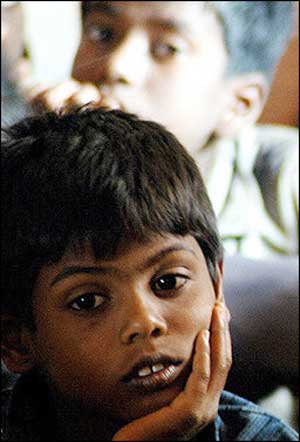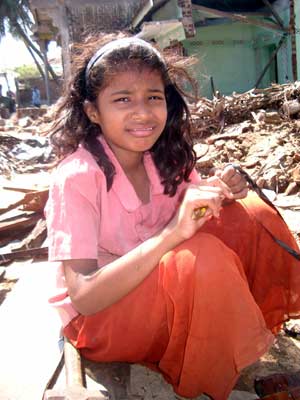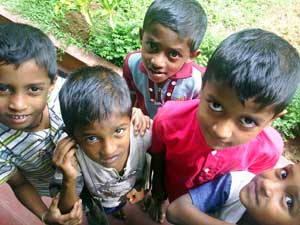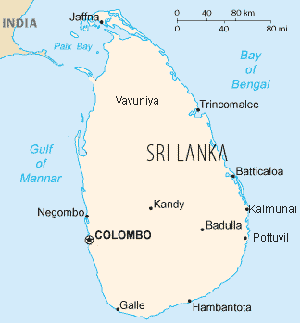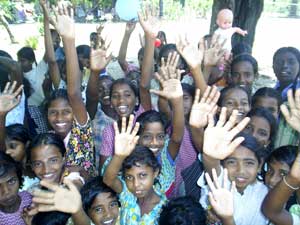
|
||||||||||
|
| ||||||||||
For Sri Lanka's orphans, the heart-wrenching road to recovery begins
GALLE, Sri Lanka (AFP) - Thushari, 15, has good reason to be crying. She saw both her parents swept to their deaths by the ferocious Indian Ocean tsunami, which also pulverised her family home and tore her from her siblings. At a Buddhist temple where she and scores of other homeless in Sri Lanka's southern city of Galle are sheltering, aid workers talk with her in the garden, seeking to find out whether any of her relatives have survived. As stunned Sri Lankans start gradually rebuilding their lives after the massive devastation wrought by the disaster, the process of tracking down orphans such as Thushari and finding them safe homes is only just beginning. "This is probably the first day in Sri Lanka, in Asia, of a long lasting effort that will now be needed for Asia's tsunami generation," UNICEF spokesman Martin Dawes said here Tuesday. "This is ground zero of the social work program... It's one of the greatest dilemmas you could possibly imagine." The difficulty in piecing together what is left of families is compounded by the trauma of the victims: anguished parents believe their children will return and heartbroken children deny their parents are dead. "It will take some time for children to accept the fact that they have lost their parents," said Kanthi Pirera, one of Thushari's interviewers and program director of UNICEF-funded non-government organisation Life Foundation. "If they haven't actually seen them swept away, they will live in the hope that they will come back." The denial and scale of the carnage and destruction -- more than 30,000 Sri Lankans were killed and nearly a million left homeless -- mean it is too early to estimate the number of children orphaned. At least 200 children lost one or both parents in this district alone, according to the National Child Protection Authority which is yet to take a census in nine other regions hit by the tsunamis. Counselling is crucial but Sri Lanka's extraordinarily strained health system cannot provide what is needed, meaning the psychological effect on the tsunami generation will be long-lasting. "We don't have enough qualified counsellors. The limited number we have are doing the best that they can," Pirera said. More than 40 government workers have started zipping around to the camps in Sri Lanka's south, tracking down and registering orphans. Another 100 from the NCPA and other agencies are on their way. It's an uphill battle, with many camps springing up spontaneously or in remote areas. After registration, skilled workers will assess what the children want, then long term plans for each child needs to be worked out, with UNICEF preferring to see children integrated back into communities rather than institutionalised. "To recover from the trauma each child needs to be placed in a nurturing home environment, with the love and attention that he or she deserves," Dawes said. "Sitting in camps is disastrous. Camp life is not normal life." The work needs to be done quickly, but carefully. Unconfirmed reports have emerged that some tsunami survivors have been molested at temporary shelters, with activists urging Sri Lankan authorities to step up protection. But placements that are too speedy can produce equally disastrous results, with children at risk of being subjected to forced labour or sexual abuse, or relatives later turning up to claim a child already happily settled. Short term caregivers are already being screened, says a UNICEF child protection worker Michael Copland. The issue of foreign adoptions meanwhile will arise only a long time down the track, after this painstaking process is completed. "People have to understand that we don't just have a truckload of kids and can say, 'These are yours'," Copland said. For Thushari, at least her siblings have survived. An elder sister working in a garment factory in the capital Colombo promises to arrive the following day. One of her two brothers turns up, showing off his bandaged leg. He refuses, however, to believe the elder sister will come, sparking a flurry of mobile phone calls and more wrenching scenes as the temple's chief monk steps in to mediate. It takes nearly an hour for the workers and siblings to agree to meet at the temple the following day to map out a possible future for the family. "This process has got to be repeated hundreds of thousands of times all over the country," said Dawes. Originally published 6 January 2005 in Yahoo News
|
